Heading into this season, the expectations were clear: If the 2019-20 version of the Calgary Flames didn’t make any meaningful improvements upon last years’ results, a roster shake-up was due. The previous five campaigns have alternated between missed playoffs and early-round exits.
While they technically notched a series win against the Winnipeg Jets—being on the smiling side of a handshake line for the first time since 2015—they were punted from the Edmonton bubble in the quarterfinal, a lingering bruise coming from surrendering seven unanswered goals in an unforgettable Game 6 collapse against the Dallas Stars. (from ”An empty feeling’: Flames’ season ends with ugly collapse in Game 6,‘ Calgary Sun, 08/21/2020)
Does this count as a step in the right direction? Do they stay the course? Many fuming fans are clamoring for a major overhaul. Luckily for the Flames, general manager Brad Treliving has a decent chunk of pocket change to hurl around—$16.91 million to be exact—to shuffle a roster that’s as inconsistent as it is underachieving.
New Head Coach?
Geoff Ward took over as the bench boss in late November when the Flames were sputtering in the standings. Carrying the “interim” tag up until the unexpected season pause, the Flames propelled from 26th overall to a playoff berth, going 25-15-3 along the way. Players praised Ward’s efforts in boosting team chemistry and jolting a stagnant offense while improving Calgary’s flailing defensive structure.
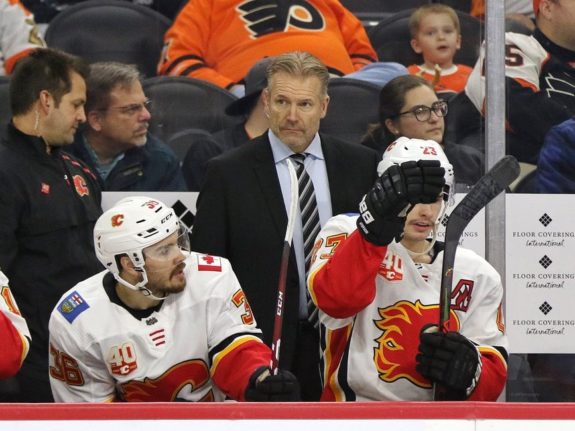
With a resume highlighted by a Stanley Cup win in 2011 as a Boston Bruins assistant, he provided a steady presence during a turbulent season, although his decision to switch goalies in Game 6 of the quarterfinal will loom over him for the time being. (from ‘Flames interim head coach Ward responds to scrutiny over goalie switch,’ Calgary Sun, 08/25/2020)
Related: The Original Jets’ Last-Ever Regular Season Game
Despite reviving the Flames’ season, big-name, big-budget coaching talents like Gerard Gallant and Peter Laviolette have been floated as possible replacements.
Is This It for Johnny Gaudreau and Sean Monahan?
The offseason elephant in the room is what to do with the first-line tandem of Johnny Gaudreau and Sean Monahan. Will they stay or go? Both had down seasons this year, and as franchise cornerstones both absorb the lion’s share of criticism when the team falters.
Averaging 0.96 points per game in the regular season but 0.63 in the postseason, Gaudreau has a history of shriveling into Johnny No-Show under the playoff spotlight. While he’s undeniably one of the NHL’s most electrifying talents—he netted 99 points and was a Hart Trophy candidate two years ago—he seems more like a Phil Kessel than a Connor McDavid—A complementary star who can’t shoulder a team. Monahan was similarly disappointing, but he still managed to pot 22 goals, eclipsing the 20-goal mark for the seventh time in his seven-year career.
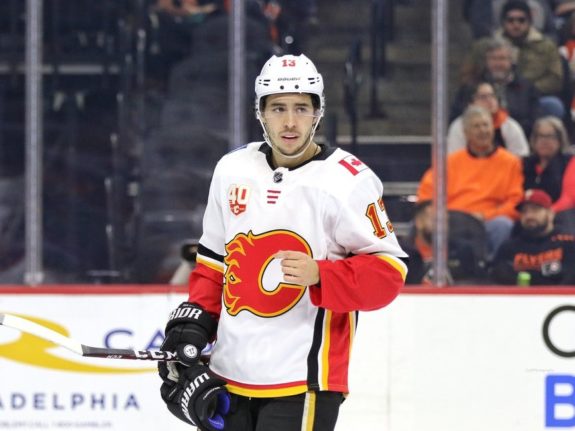
Gaudreau has two years remaining on his contract, but next season he will have a modified no-trade clause—only a five-team trade list. Outside of his impending $3.5 million signing bonus, his pact is team-friendly, with an annual cap hit of $6.75 million and only $10 million in cash owed over the duration of the deal. Monahan is signed through three more seasons, carrying an annual cap hit of $6.375 million.
Trading a superstar is risky business, let alone two productive forwards in their mid-20s on fair deals, each ranking among the NHL’s top-50 point-per-game forwards since the start of the 2014-15 season. As NBC’s Adam Gretz noted, when these types of top-flight scorers have been exported—Kessel, Artemi Panarin, Blake Wheeler, Tyler Seguin, Taylor Hall, Mark Stone, Jakub Voracek and Ryan O’Reilly—these deals have produced embarrassing, if not nightmarish, results for the teams that shipped them away.
Building Around Matthew Tkachuk?
Matthew Tkachuk emerged as the heart of the Flames’ offense, with his willingness to stand at the edge of the crease, his ability to draw penalties, and his knack for delivering in clutch moments. It seems as if a rich vein of grit and offensive production courses through No. 19, so the question is how do the Flames build a roster that complements the snarky style of a left-winger who loves to muck it up?
Treliving tried to land Nazem Kadri in a swap last summer before the now-Colorado Avalanche center nixed the trade, but it’s apparent the Flames were trying to add more tenacity, more secondary scoring, and more depth up the middle. Sam Bennett could be an in-house answer if he can sustain over an 82-game marathon—after a ho-hum season as a winger, he switched to center for the bubble battles and led the team in goals (5), points (8) and hits (54).
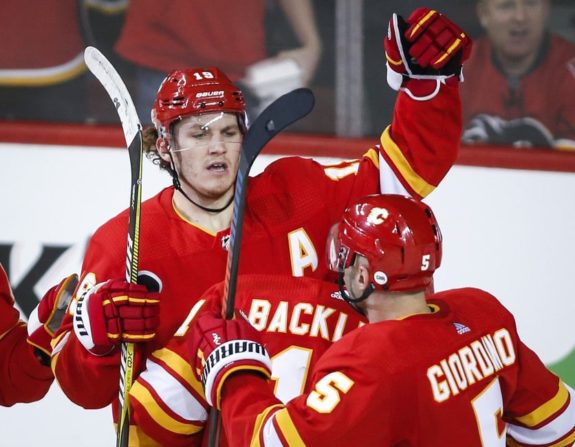
Perhaps Treliving tries to package his blue-chip winger and Monahan for a blue-line anchor to complement a 37-year-old Mark Giordano, then takes a swing at Hall. Or Treliving decides to keep his star duo intact and adds the free-agent left-wing jewel to bolster their firepower. However, the requisite top-dollar contract to nab Hall would land the Flames in a similar situation as the Toronto Maple Leafs, with a salary cap glut dedicated to the top-six. Otherwise, Tyler Toffoli looks like a more affordable option who brings Stanley Cup championship experience and consistent secondary production.
The Flames will want to bring back Andrew Mangiapane after a breakout season of 17 goals and 32 points in 68 games that established him as a feisty finisher and takeaway machine who drove his line. The 2015 sixth-round pick established himself as a fixture in Calgary’s top-nine, and the team will consider anything between another one-year lease and a long-term arrangement. Evolving-Hockey’s contract projection tool predicts it to be four years at $3.04 million per season.
A divorce from Mark Jankowski is more likely, as the 2012 first-round pick disappointed with 5 goals and 7 points in 56 games, after a breakout season in 2018-19. He’s due $1.75 million as a restricted free agent. Top prospect Glenn Gawdin led the farm club with 47 points and represented the Stockton Heat at the AHL’s All-Star Game, and could earn a promotion if Treliving balks at Jankowski’s qualifying offer. (from ‘Proof of his progress, Flames prospect Gawdin to skate among AHL all-stars,’ Calgary Sun, 01/25/2020)
Milan Lucic was rumored to be a potential buy-out candidate. Sure, he’s overpaid at a $5.25 million cap hit, but he fulfills his role as a much-needed banger and occasionally slides into the top trio. The structure of his deal doesn’t make a buyout favorable for this year—it would save the Flames $500,000 for the upcoming season, but if they bail on his contract next summer, it would wipe $2 million off the books for 2021-22.
Flames’ Free-Agent Defensemen
Calgary’s defense projects to be overhauled by the time the players return to training camp. It’s easier to list those who will remain under contract—Mark Giordano, Rasmus Anderson, and Noah Hannifan—than it is to list the free agents on their back end. Smooth-skating T.J. Brodie, trade-deadline acquisitions Derek Forbort and Erik Gustafsson, hard-nosed Travis Hamonic, and spare-part Michael Stone are all set to roam the open market.
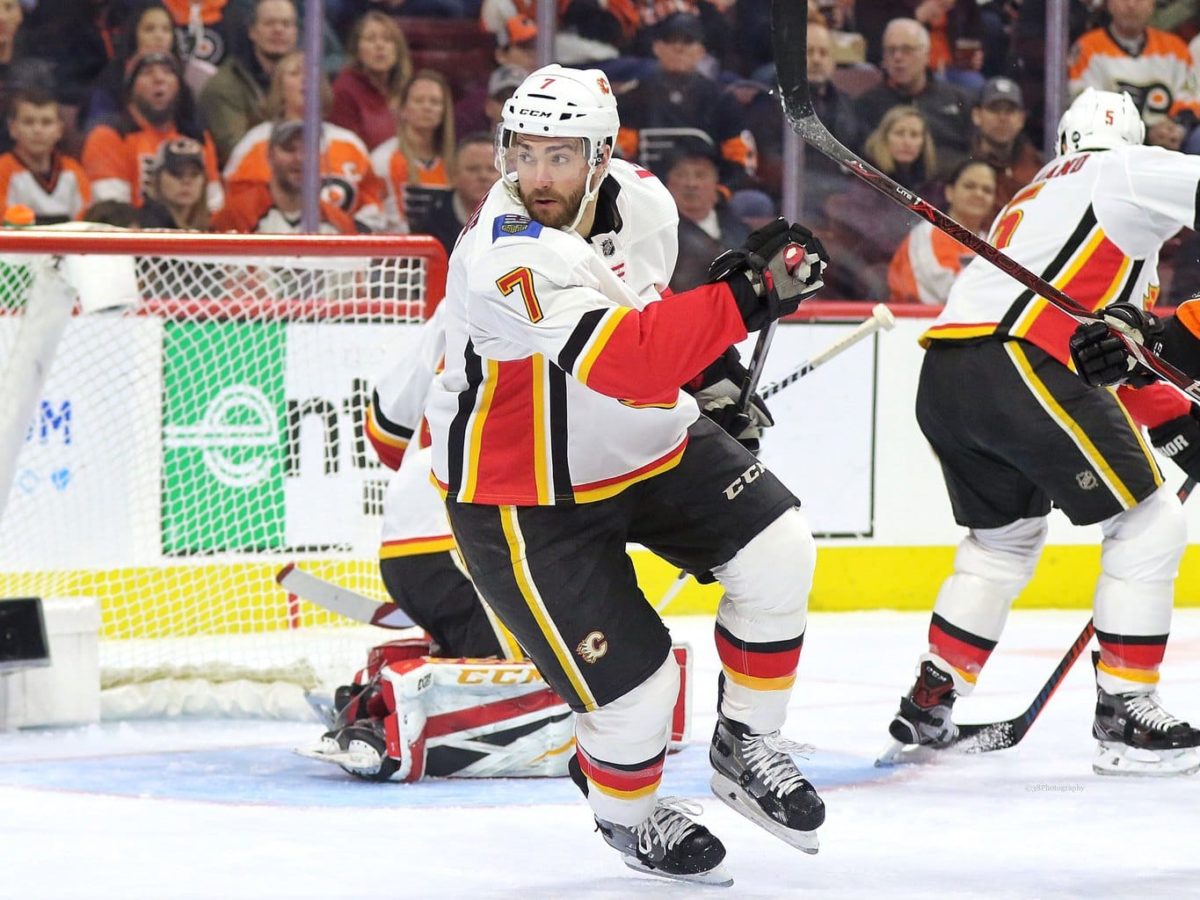
At age 30, and after six straight 30-plus point seasons, Brodie’s point total fell to 19, though he is still capable of playing top-four minutes. The Flames acquired power-play specialist Gustafsson from the Chicago Blackhawks at the deadline, and while the Swedish defenseman had an explosive 2018-19 season (17 goals and 60 points in 79 games), his offense suffered in Calgary due to limited ice time and poor overall fit. Hamonic is an absolute workhorse who consistently logs over 20 minutes of usage a night, and he will likely snag a fat check on the open market due to his defensive reliability and leadership presence.
Andersson is the only right-handed shot signed for next year, so depending on the cost, the Flames could push for either Hamonic or Brodie to return. Otherwise, younger, cheaper prospects in the pipeline like Andersson and Juuso Valimaki are ready to fill any potential vacancies. The recent signings of highly touted American collegians Colton Poolman and Connor Mackey also solidify some organizational point-man depth, as at least one of them is expected to push for a roster spot next season. (from ‘Colton Poolman signs with Calgary Flames,’ Grand Forks Herald, 03/20/2020)
If the St. Louis Blues arrive at a contractual impasse with stud blueliner Alex Pietrangelo, Calgary could throw a boatload of cash at him and make him the long-term anchor and replacement of the 37-year-old Giordano, whenever he retires. Other potential adds include Sami Vatanen or Torey Krug.
Solving the Flames’ Goaltending Situation
Following a pair of horrific campaigns that cast his NHL future into doubt, Cam Talbot rebounded with steady regular season play and a stellar playoff performance, proving he still has starter-stuff within him. Although he made just 26 appearances this season, he posted a .919 save percentage and a 2.63 goals against average, which warrants a raise from his $2.75 million one-year prove-it deal. There are rumblings that the Flames and Talbot would like to extend this relationship, but he is also 33, so he’d be more of a short-term fix than a goaltender-of-the-future.
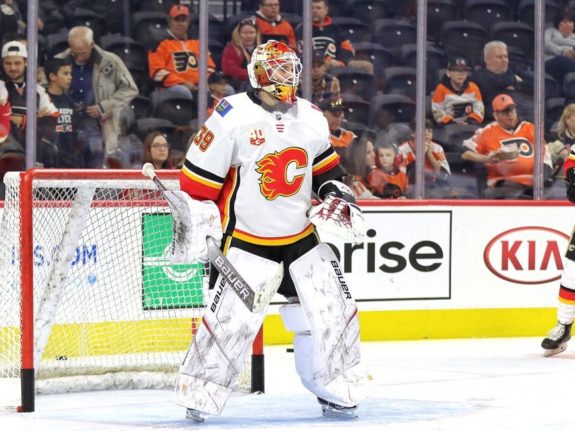
At age 28, David Rittich is the younger of the two, and is under contract next season. With a skittish end to the season, the Flames may not trust him to hold down the fort. If the Flames do believe the latter netminder is their guy, they could go after Thomas Greiss or Aaron Dell in free agency to serve as the other half of a tandem.
There is a slight chance Treliving is intrigued by a big-ticket name on a free-agent class highlighted by Jacob Markstrom, Robin Lehner and Braden Holtby to solidify a position that lacks organizational depth.
What Should Flames Fans Expect This Offseason?
In a year that has proven humanity’s future-predicting comically woeful, I will nonetheless armchair GM the Flames offseason based purely on speculative blogging.
I don’t expect either Gaudreau or Monahan to be moved this offseason. Similarly skilled players with comparable contracts—Hall, Kessel, Jason Zucker, J.T. Miller, Mark Stone, Kevin Hayes and Matt Duchene—were moved for multiple picks (including a first-rounder), one or two roster players, and a top prospect. If the Flames are in a win-now mode, I don’t see how a similar return maximizes their Stanley Cup window unless they out-woo the other (at least) half-dozen teams vying for Hall’s services.
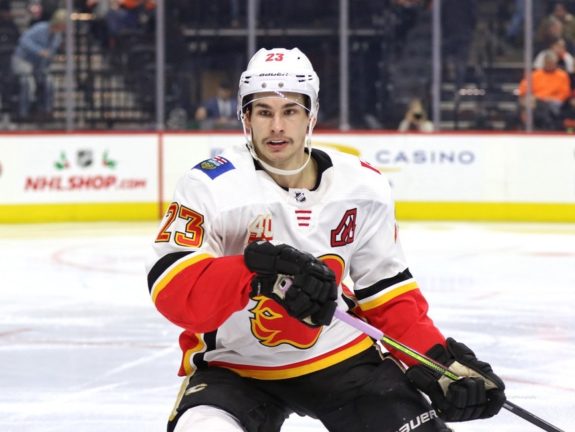
It makes more sense to tweak around the edges than it does to blow up an offense that averaged 3.33 goals per game in 42 matches under Ward’s helm. Perhaps the first, and most obvious, task at hand is resigning Mangiapane. Sam Bennett’s future role is more intriguing, but given his recent playoff performance but lackluster winter play, the Flames could try him as a third-line pivot and see if he can improve from there. This would mean the Flames would need to round out the middle six with a reliable second-line center and another winger, and they could pursue one or two available solid depth players like Toffoli, Mikael Granlund, Mike Hoffman, Carl Soderberg, Vladislav Namestnikov or Craig Smith.
Related: Flames’ Best & Worst Drafts in Franchise History
Naturally, given the number of free agents that could depart, the Flames defense will see a lot more turnover just from a potential youth movement alone. It would be hard to believe the Blues and Bruins would let Pietrangelo or Krug walk, so if Calgary adds anyone in free agency, it would be more likely to be someone like Vatanen or Kevin Shattenkirk, or they resign one of Brodie or Hamonic.
Talbot proved to be a good fit in Calgary, and it seems there is mutual interest in both camps to keep this arrangement going. This may not be the sexiest free-agent splash, but it’s a prudent move. Even with a pay bump, Talbot will be a far more affordable option than whatever Holtby or Lehner will command on the open market.
Despite the outcry for a drastic and draconian roster reshuffling, it would be an overreaction to dismantle a core based on an early playoff exit on the heels of a four-month layoff that caught plenty of should-be Cup contenders flat-footed. The Flames were two-and-a-half periods away from taking one of the Western Conference’s best teams to a sudden death tilly. With a little tinkering, the Calgary should be in the thick of contention again next year.